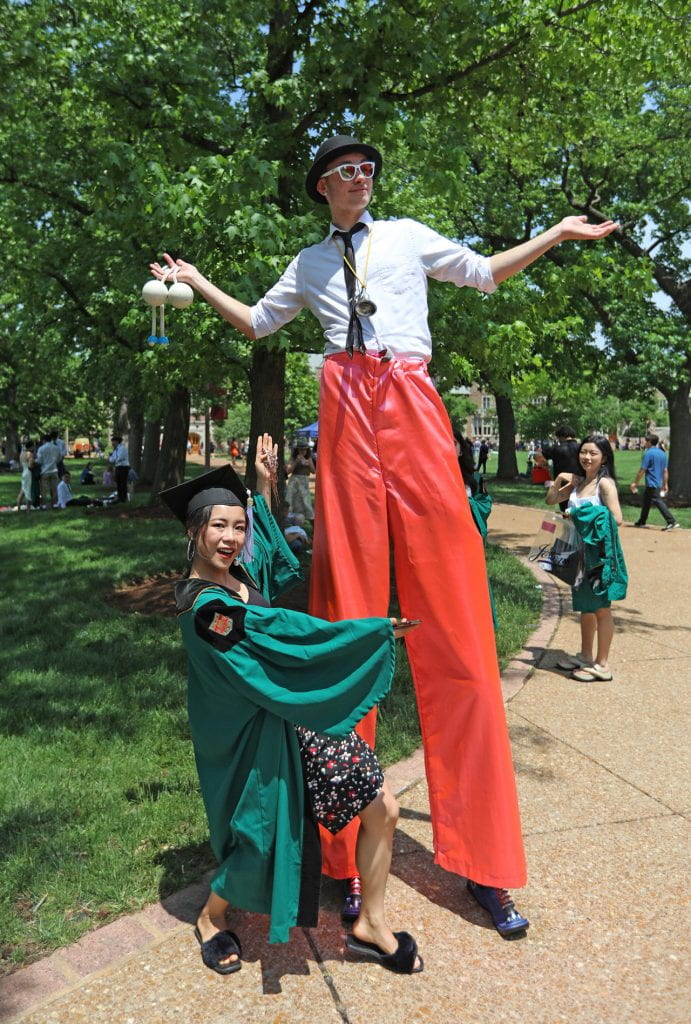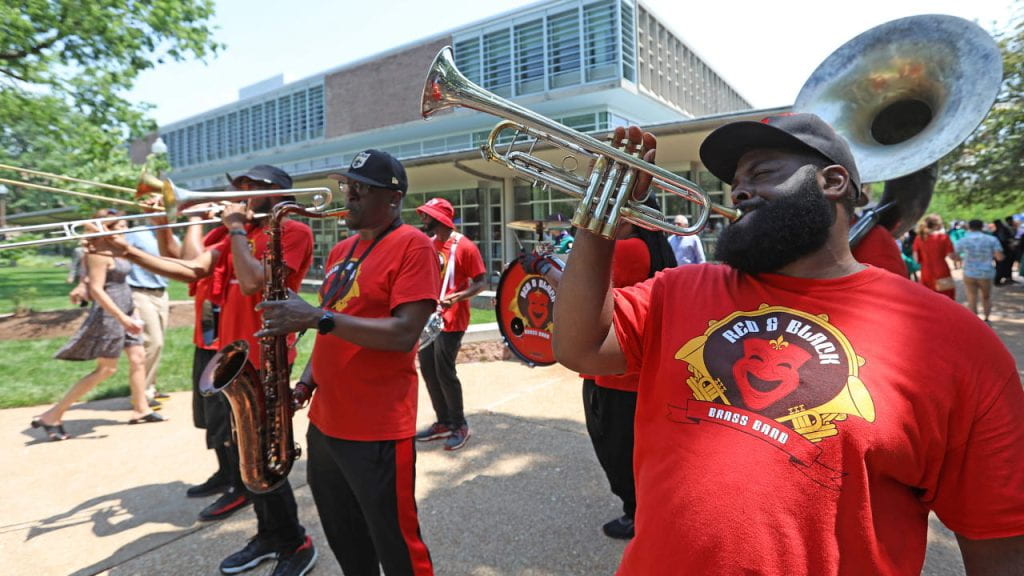There was nothing but smiles on the morning of May 20, 2022: graduates posed for photos in front of the giant “2022” blocks, families clutched floral bouquets for their graduates, and a man in a bowler hat walked around campus on stilts. Yes, stilts! We’ll get to that in a moment.
Washington University in St. Louis has aimed for zero waste Commencement receptions since 2014. Through these efforts, the university typically achieves a 98% waste diversion rate through recycling and composting.
These efforts would not be possible without the commitment and coordination of several campus players including the Commencement Office, Dining Services, Facilities Planning & Management, WFF staff, the Office of Sustainability, and waste station volunteers. Additionally, earthday365 provides staff through its Recycling on the Go program.
Coordinating the waste planning for such a monumental event requires a significant amount of planning. Assistant director of sustainability, Cassie Hage, started working with partners on planning the materials and waste strategy in January. On collaboration, Hage states that, “we are at the point in the evolution of the program that all the players have a pretty good idea of the goal, the expectations, and how to get there. It still requires persistence and intentionality because [Commencement] is a big effort and, in many ways, we are still working against the grain.”

Now, back to that guy on stilts. Michelle Gelven, director of commencement, shared that WashU’s 161st Commencement marked a number of firsts. This was the first time that gathering on Francis Field for Commencement Ceremonies was allowed without any restrictions (until 2019, WashU Commencement took place on Brookings Quad). It was also the first year that the post-Commencement ceremony was organized as a Festival that incorporated entertainment, live music, and local food, stretching from Mudd Field to Tisch Park on the East End of campus. Finally, the University welcomed back three 50th reunion classes to celebrate and walk in the procession (Classes of 1970, 1971, and 1972).
The increased physical footprint of the Festival, along with the incorporation of over 15 local food and beverage vendors, required more waste stations and staffing than in the past. In addition to staff from the Office of Sustainability, WFF, and earthday365, a group of WashU employee volunteers also pitched in to maximize waste diversion from the landfill.
When asked about what additional considerations went into the planning, Hage remarked that she was excited about the focus on local food, particularly the focus on WashU alumni and minority and women-owned businesses. “The local aspect of the food is really exciting and provided an opportunity (and challenge) to work with the purveyors on their packaging. Beyond the optics of the waste sorting effort, the social and environmental effects of responsible and equitable purchasing are essential.”
Dining Services sourced most of the food serviceware and kept it simple in order to reduce waste, a key component of achieving Green Event Certification, which was critically important to Gelven and her team as they planned Commencement. Food waste was not the only consideration made by her team. “We also continue to decrease the size of the printed program, moving elements to the website,” Gelven shared. Additionally, the paper used for the programs was made of post-consumer recycled content.
With the rapid warming of the planet, identifying more sustainable ways to continue celebrating special occasions will become increasingly critical. Through public commitments to sustainability such as the annual Commencement activities, WashU is prioritizing the planet while celebrating the students who make this place so extraordinary.
As a final thought, Gelven shared a reflection on the event. “I was most excited about getting everyone together in one space to celebrate our incredible students! I was also incredibly excited for the Festival and all of the local food and beverages, games, entertainment, photo stations, and more. Seeing everyone celebrate throughout the entire central corridor of campus was very special, and something I won’t soon forget.”
To learn more about WashU’s commitment to Zero Waste Commencement, please check out the following pages:
Zero Waste Commencement resource page
